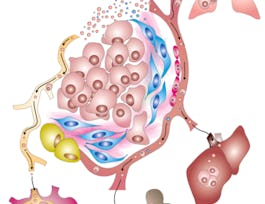Over 500,000 people in the United States and over 8 million people worldwide are dying from cancer every year. As people live longer, the incidence of cancer is rising worldwide, and the disease is expected to strike over 20 million people annually by 2030.



Understanding Cancer Metastasis
This course is part of Cancer Biology Specialization



Instructors: Kenneth J. Pienta, M.D.
Sponsored by University of Michigan
62,266 already enrolled
(2,439 reviews)
Skills you'll gain
Details to know

Add to your LinkedIn profile
6 quizzes
See how employees at top companies are mastering in-demand skills

Build your subject-matter expertise
- Learn new concepts from industry experts
- Gain a foundational understanding of a subject or tool
- Develop job-relevant skills with hands-on projects
- Earn a shareable career certificate


Earn a career certificate
Add this credential to your LinkedIn profile, resume, or CV
Share it on social media and in your performance review

There are 6 modules in this course
In this first module, we'll concentrate on the history and overview of metastasis and give you a flavor of how cancer is defined as well as some of the history surrounding how we began to understand metastasis.
What's included
5 videos1 quiz
In this module, we'll focus on uncontrolled cell division, which is a defining property of cancer, as well as mutation and neoangiogenesis and their roles in tumor formation. We'll also take a look at a primary tumor microenvironment and its component cell types.
What's included
5 videos1 quiz
During this module, we'll turn our attention to the next steps after the initial primary tumor formation, epithelial to mesenchymal transition of cancer cells, and local tumor invasion and intravasation into blood or lymph vessels.
What's included
4 videos1 quiz
We'll now take a close look at cancer survival within the circulation, the role of the circulatory system in metastasis, the genetic determinants of metastatic potential, signalling mechanisms, chemokines, the dock and lock hypothesis, and extravasation.
What's included
6 videos1 quiz
In this module, we'll focus on dormancy and secondary tumor growth and how they contribute to the lethality of cancer.
What's included
6 videos1 quiz
In the previous modules, we've looked closely at the sequential steps of metastasis and some of the biology of how metastasis occurs. Now, we'll turn our attention to morbidity and mortality, or in other words, how cancer hurts and kills people.
What's included
4 videos1 quiz
Instructors



Offered by
Why people choose Coursera for their career




Learner reviews
2,439 reviews
- 5 stars
87.05%
- 4 stars
11.59%
- 3 stars
0.94%
- 2 stars
0.20%
- 1 star
0.20%
Showing 3 of 2439
Reviewed on Apr 17, 2020
very simple informative course about Cancer and its mets. how cancer migrate to organs and how it cause damage and some of definitions & theories that can simplify the whole process
Reviewed on May 9, 2021
It's a very thorough course. It not only is informative but is very insightful. I shall recommend this course to every individual who is curious to know more about cancer.
Reviewed on Jul 1, 2020
A big thanks to John Hopkins University for this course the faculty of this university is one of the best faculty i have ever seen all things are much clear and confidential.
Recommended if you're interested in Health

Stanford University

University of California, Irvine

Open new doors with Coursera Plus
Unlimited access to 10,000+ world-class courses, hands-on projects, and job-ready certificate programs - all included in your subscription
Advance your career with an online degree
Earn a degree from world-class universities - 100% online
Join over 3,400 global companies that choose Coursera for Business
Upskill your employees to excel in the digital economy






